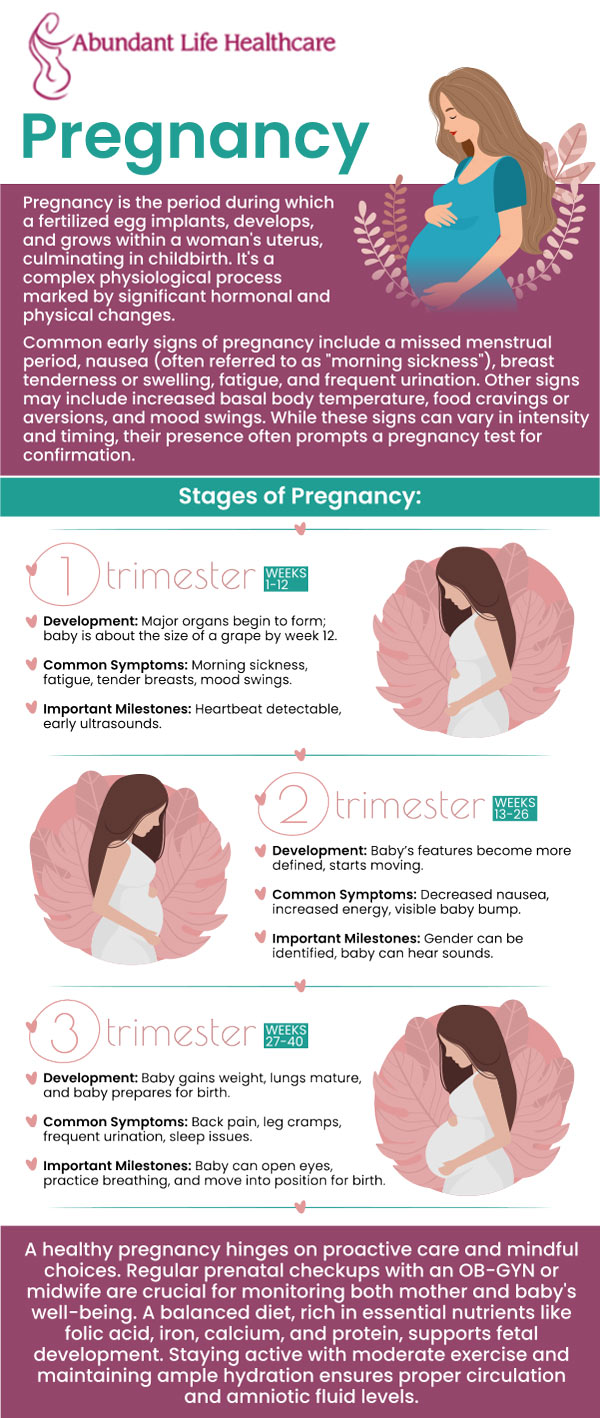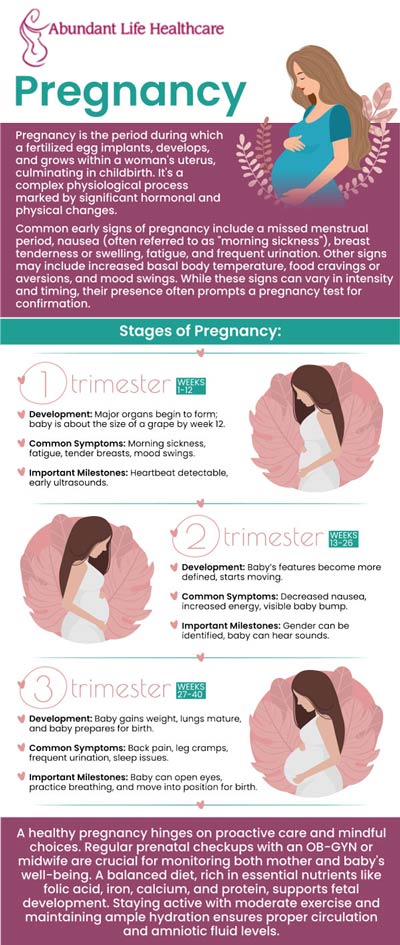Pregnancy Specialist in Lawrenceville, GA
Dr. Marc Jean Gilles, DO, FACOG, at Abundant Life Healthcare specializes in providing comprehensive care to pregnant women. He provides advice on fetal health, diet, exercise, and possible issues. Along with helping with childbirth, he also performs routine check-ups and monitors fetal development. He also offers postpartum care in specific circumstances. For more information, contact us or schedule an appointment online. We are conveniently located at 601A Professional Drive, Suite 370, Lawrenceville, GA 30046.




Table of Contents:
How early do pregnancy signs start?
What do I need to know about being pregnant for the first time?
What are 4 things that must happen for a successful pregnancy?
How does your womb feel in early pregnancy?
Pregnancy signs can vary widely among individuals and may begin as soon as the initial several weeks after conception. Some women may experience symptoms within a week or two after ovulation and conception; however, some women may not notice changes until many weeks into their pregnancy.
Common early signs of pregnancy include:
• Missed period: This is often the first sign of pregnancy and might prompt a woman to take a pregnancy test. If you are typically regular with your menstrual cycle and miss a period, it could be an early sign that you are pregnant.
• Implantation bleeding: When the fertilized egg attaches to the uterine lining, this can happen, typically 10 to 14 days after conception. This bleeding could be mistaken for a light period by some women.
• Breast tenderness or swelling: Hormonal changes can make the breasts sensitive and sore soon after conception. The color of the nipples might darken, and they may become more prominent.
• Nausea and vomiting: Morning sickness can begin as early as two weeks after conception. Despite its name, morning sickness can occur at any time of the day, and some women could also suffer vomiting.
• Fatigue: An early indicator of pregnancy may be feeling excessively tired or fatigued as your body adjusts to the hormonal changes.
• Increased urination: Due to increased blood supply to the kidneys and the production of chorionic gonadotropin (hCG), hormone changes can also cause frequent urine.
• Mood changes: Hormonal fluctuations during pregnancy can lead to mood swings and increased emotional sensitivity.
Other signs can include a change in the sense of taste or smell, and food aversions or cravings can occur early in pregnancy as well. While these signs can be indicative of an early pregnancy, they can also be symptoms of other conditions or the result of natural hormonal fluctuations. Therefore, it’s important to take a pregnancy test, or if you think you might be pregnant, see a doctor.
Pregnancy leads to various physiological changes due to hormonal shifts. Early signs of pregnancy often include missed periods, fatigue, nausea, food aversions or cravings, and increased urination. As the pregnancy progresses, you may also experience breast tenderness, changes in appetite, and, as your belly grows, changes in your posture, balance, and mobility.
Our healthcare team is your essential resource throughout your pregnancy. Regular prenatal check-ups allow us to monitor your health and your baby’s health. During these visits, we conduct tests, including checking your weight, blood pressure, urine, blood tests, and ultrasounds, to understand your baby’s growth, position, and overall well-being.
A balanced diet is crucial during pregnancy. Our team can guide you in increasing your intake of essential nutrients like folic acid, iron, and calcium, which are crucial for your baby’s development.
Exercise is beneficial during pregnancy, but it’s important to modify your routine as it progresses. Our team can provide recommendations on safe, low-impact activities like swimming, walking, and prenatal yoga.
Contact Dr. Gilles and our team immediately if you experience vaginal bleeding or spotting, severe abdominal pain, fever or chills, persistent vomiting, or decreased fetal movement.
We understand that a successful pregnancy is a complex process involving multiple critical steps. Our commitment is to help you at every stage of pregnancy.
Firstly, we offer support and guidance in understanding ovulation – the ovary releasing a fully developed egg, ready to be fertilized. We provide individual consultations to discuss the health of both the egg and the sperm, which are essential for successful fertilization.
Secondly, we help facilitate understanding of the fertilization process. This normally occurs in the fallopian tubes that connect the ovaries to the uterus. We can provide advice on improving the chances of successful fertilization.
Upon fertilization, the third essential step is the implantation of the fertilized egg, now known as a zygote. We provide professional care to ensure that the uterus provides a nurturing and supportive environment for the zygote to implant and grow.
Maintaining the pregnancy, the fourth and last essential step for a successful pregnancy is a procedure that our team closely monitors. They ensure that the complex interplay of hormones that are essential for ovulation, implantation, and maintenance of the pregnancy are in check, thereby supporting a healthy uterine lining and suppressing uterine contractions.
We understand that early pregnancy brings about numerous changes in your body. We are available to help you navigate these adjustments and ensure a healthy pregnancy journey for you and your baby.
As your fertilized egg implants itself in your womb, your body initiates a series of hormonal changes. Your womb begins to expand, and you may experience feelings of fullness or mild cramping, similar to menstrual discomfort. You might also notice a slight increase in vaginal discharge, which is typically clear, milky, and odorless.
Some women report mild cramping, often mistaken for menstrual cramps. This is a natural response to the uterus expanding and can sometimes be accompanied by light spotting. However, if you experience severe cramping or bleeding, we advise that you contact our practice immediately, as it could signal a potential problem.
As your uterus grows, you may feel a sensation of pulling or pricking in your lower abdomen. This is due to the ligaments supporting your uterus stretching and thickening. Some women also report increased sensitivity in their lower abdomen due to increased blood flow to the uterus and the formation of the placenta.
We emphasize that every woman’s early pregnancy experience is unique. Some women may feel these sensations strongly, while others might not notice them at all. Throughout your pregnancy, it’s crucial to stay aware of any changes within your womb. While some discomfort is normal, severe pain, bleeding, or a sudden decrease in fetal movement should prompt immediate consultation, as these symptoms may indicate potential complications that warrant medical attention.
At Abundant Life Healthcare, your health and the health of your baby are our top priorities. Our team is here to provide you with the highest standard of prenatal care and support. For more information, contact us or schedule an appointment online. We are conveniently located at 601A Professional Drive, Suite 370, Lawrenceville, GA 30046. We serve patients from Lawrenceville GA, Suwanee GA, Snellville GA, Duluth GA, Dacula GA, Lilburn GA, Loganville GA, Auburn GA, and surrounding areas.
Check Out Our 5 Star Reviews


Additional Services You May Like

Additional Services You May Like
- Obstetrics
- Pregnancy
- Gynecologist
- Birth Control
- Labiaplasty
- Microblading
- Weight Loss
- Semaglutide GLP-1
- Pap Smears
- Pelvic Pain
- Laser Hair Removal
- In House Ultrasound (Including 3D)
- Vaginal Birth After C-Section (VBAC)
- Pregnancy As High Risk
- Multiple Gestations
- Postpartum Counseling
- 24hour/365days On Call Service
- Annual Exam
- Abnormal Uterine Bleeding
- Management Of Endometriosis
- Ultrasound
- Pelvic Organ Prolapse
- Urinary Incontinence
- Perimenopause And Menopause
- Sexual Dysfunction
- Fat Freeze (Like Cool Sculpting)
- Body Contouring
- Ozempic
- Civil Surgeon
- Hormone Replacement Therapy
- Immigration Medicine
- Biote Hormone Pellets
- GLP-1
- Peptide Therapy




